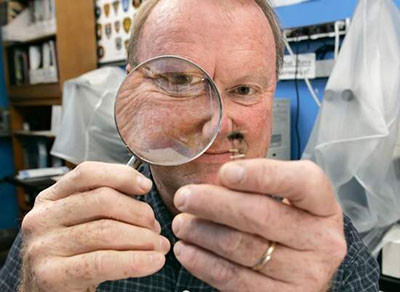Ralph Williams, Purdue entomology professor, uses bugs to solve mysteries
 |
| Professor of entomology Ralph Williams takes a closer look at a blow fly Monday in Stone Hall at Purdue University. The insects can help crime investigators determine a victim's time of death. (Photo courtesy of John Terhune/Journal & Courier) |
Ralph Williams, an entomology professor who teaches forensic science and crime investigation at Purdue University, said forensic entomology is a relatively new area of entomology.
"It's a big job in law enforcement crime labs and detective units in the military," he said.
According to Williams, forensic means pertaining to a court of law.
"The primary utility for forensic entomologists is in murder cases, but we can be called for any legal matter relating to insects," he said.
"Insects are the most abundant creatures on earth, with over one million species identified. We think there are 10 million, especially in tropical areas.
"Some are pretty to look at and some are destructive," Williams said about bugs. "(Crime investigation) is one way insects can be useful."
Williams works closely with city and county police departments.
Paul Huff, a detective with the Lafayette Police Department, said the collection of evidence and documentation at a crime scene is a very detailed process.
"We collect fingerprint items, DNA, and both live and dead samples of insects," he said. "They must be packaged properly to maintain the integrity of the evidence."
Other crime scene investigators include pathologists, odontologists (those who study teeth), botanists and anthropologists.
How do insects help detectives when they are trying to determine how someone died?
One way is that they can determine the time of death.
"Part of the natural decomposition process is insect presence," Williams said.
He said that by looking at the life cycles of insects on a body, particularly blow flies and their eggs and larvae, forensic entomologists can determine the time of death.
There are other ways insects can be helpful, Williams said.
He said insects can be used to link a particular suspect to the crime scene and alert investigators to the geographic location when the death occurred, since insects live in specific habitats.
In addition, the presence of insects on a particular body part can determine the possible site of trauma, Williams said.
"Drug residue from insects can determine the toxicology of the decedent," Williams said. "We can also analyze blood-filled mosquitos for DNA to know if the victim was alive at a certain time."
|